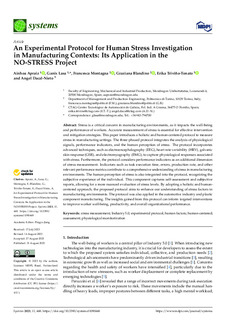| dc.rights.license | Attribution 4.0 International | |
| dc.contributor.author | Apraiz Iriarte, Ainhoa | |
| dc.contributor.author | Lasa, Ganix | |
| dc.contributor.other | Montagna, Francesca | |
| dc.contributor.other | Blandino, Graziana | |
| dc.contributor.other | Triviño-Tonato, Erika | |
| dc.contributor.other | Dacal-Nieto, Angel | |
| dc.date.accessioned | 2024-02-02T08:53:15Z | |
| dc.date.available | 2024-02-02T08:53:15Z | |
| dc.date.issued | 2023 | |
| dc.identifier.issn | 2079-8954 | |
| dc.identifier.other | https://katalogoa.mondragon.edu/janium-bin/janium_login_opac.pl?find&ficha_no=173270 | |
| dc.identifier.uri | https://hdl.handle.net/20.500.11984/6231 | |
| dc.description.abstract | Stress is a critical concern in manufacturing environments, as it impacts the well-being and performance of workers. Accurate measurement of stress is essential for effective intervention and mitigation strategies. This paper introduces a holistic and human-centered protocol to measure stress in manufacturing settings. The three-phased protocol integrates the analysis of physiological signals, performance indicators, and the human perception of stress. The protocol incorporates advanced techniques, such as electroencephalography (EEG), heart rate variability (HRV), galvanic skin response (GSR), and electromyography (EMG), to capture physiological responses associated with stress. Furthermore, the protocol considers performance indicators as an additional dimension of stress measurement. Indicators such as task execution time, errors, production rate, and other relevant performance metrics contribute to a comprehensive understanding of stress in manufacturing environments. The human perception of stress is also integrated into the protocol, recognizing the subjective experience of the individual. This component captures self-assessment and subjective reports, allowing for a more nuanced evaluation of stress levels. By adopting a holistic and human-centered approach, the proposed protocol aims to enhance our understanding of stress factors in manufacturing environments. The protocol was also applied in the automotive industry and plastic component manufacturing. The insights gained from this protocol can inform targeted interventions to improve worker well-being, productivity, and overall organizational performance. | |
| dc.language.iso | eng | |
| dc.publisher | MDPI | |
| dc.rights | © 2023 The Authors | |
| dc.rights.uri | http://creativecommons.org/licenses/by/4.0/ | |
| dc.subject | stress measurement | |
| dc.subject | Industry 5.0 | |
| dc.subject | experimental protocol | |
| dc.subject | human factors; | |
| dc.subject | ODS 3 Salud y bienestar | |
| dc.subject | ODS 8 Trabajo decente y crecimiento económico | |
| dc.subject | ODS 9 Industria, innovación e infraestructura | |
| dc.title | An Experimental Protocol for Human Stress Investigation in Manufacturing Contexts: Its Application in the NO-STRESS Project | |
| dcterms.accessRights | http://purl.org/coar/access_right/c_abf2 | |
| dcterms.source | Systems | |
| local.contributor.group | Centro de Innovación en Diseño | |
| local.description.peerreviewed | true | |
| local.identifier.doi | https://doi.org/10.3390/systems11090448 | |
| local.contributor.otherinstitution | CTAG Centro Tecnológico de Automoción de Galicia | |
| local.source.details | Vol. 11. N. 9. N. Artículo 448. August, 2023 | |
| oaire.format.mimetype | application/pdf | |
| oaire.file | $DSPACE\assetstore | |
| oaire.resourceType | http://purl.org/coar/resource_type/c_6501 | |
| oaire.version | http://purl.org/coar/version/c_970fb48d4fbd8a85 | |
| oaire.funderName | European Commission | |
| oaire.funderIdentifier | https://ror.org/00k4n6c32 http://data.crossref.org/fundingdata/funder/10.13039/501100000780 | |
| oaire.fundingStream | EIT Manufacturing within the second Call for Innovation activities for the Business Plan 2023-2025 | |
| oaire.awardNumber | 23472 | |
| oaire.awardTitle | Sin información | |
| oaire.awardURI | Sin información | |








